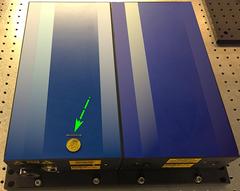URL: https://www.desy.de/news/news_search/index_eng.html
Breadcrumb Navigation
DESY News: Femtochip: paving the way to innovative lasers
News
News from the DESY research centre
Femtochip: paving the way to innovative lasers
Femtosecond lasers have become indispensable in research. They can be used to study ultra-fast processes in materials and molecules and have great potential for applications in fields as diverse as optical telecommunications, quantum technologies and optical spectroscopy. However, these lasers are traditionally relatively large and quite expensive. A team led by DESY scientists Franz Kärtner, Tobias Herr and Neetesh Singh with industrial and academic partners from four countries has set out to make the same functionality available in a much smaller and more cost-effective way: on a microchip. The research project called "Femtochip" is funded by the European Commission.

The green arrow points to a chip that can be equipped with up to ten femtosecond lasers. The blue box on which it rests, on the other hand, is a single conventional laser. Picture: CFEL / Neetesh Singh
Major advances in laser physics, microtechnology and materials science are needed before an integrated short-pulse laser can be realised on a chip, and the team is striving to make these advances. "If we achieve what we set out to do with the "FEMTOCHIP" project, we will lay the foundation for a low-noise and powerful femtosecond laser technology that will then be available to science and industry at a fraction of the usual cost," says Franz Kärtner, Senior Scientist at DESY. "It literally is a fraction: we hope that femtochip lasers will cost only about one percent of what research centres currently spend on laser systems."
The consortium consists of DESY, the University of Twente in the Netherlands, Aalto University in Finland, the Ecole Polytechnique Fédérale de Lausanne in Switzerland and the companies LIGENTEC SA from Switzerland and EURA AG from Germany. The combined expertise of experts in ultrafast laser technology, micro-integration, materials science and industrial applications is supposed to overcome the many technical hurdles that have so far made femtosecond lasers on chips impossible.
The laser flashes will later be produced with ultra-high precision directly on the microchip. Everything with a need to be small or mobile and requires precisely timed laser pulses could benefit from this - for example, medical diagnostics, mobile environmental sensors, navigation systems and quantum technologies.



